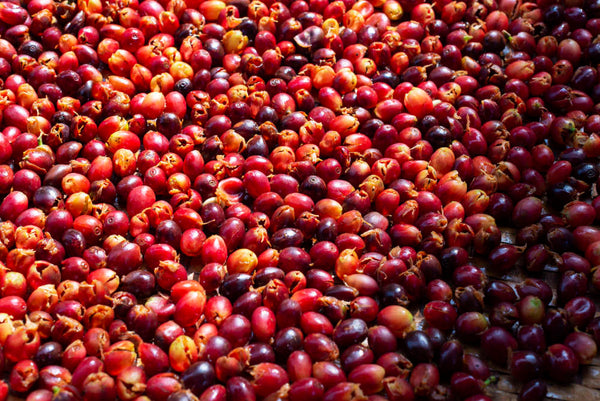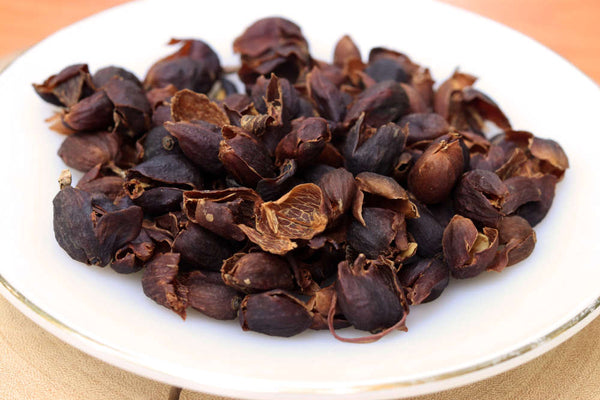Discovering the origins of cascara-based coffee tea was an eye-opening experience. Our revelations included why this dried pulp's price is twice that of regular coffee, as well as whether or not it's a safe drink for consumption. Despite its name and appearance, we can assure you that drinking cascara provides more of a sweet fruit flavor than anything else!
"Coffee tea"
The beverage derived from cascara, the dried coffee pulp commonly referred to as "coffee tea" has a taste more akin to that of a dry fruit drink. Despite its unfamiliarity, many in the coffee industry are confident this will soon become an enormously popular product. Starbucks added a cascara latte onto their seasonal menu way back in 2017!
Although some people claim that cascara is unsafe for consumption, unfounded rumors are circulating about its production process. Allegedly farmers spread the pulp on the ground and rake it with shovels until it dries, when mold may form on top of it.
After researching, we ascertained exactly what cascara is, the reason why it's twice as expensive as coffee beans, and how safe consuming a beverage made from it is for human well-being.
Cascara - coffee waste
Rich, aromatic cascara is derived from the dried pulp of coffee berries and can be found in coffees imported from Peru, El Salvador, Costa Rica, Bolivia, and Yemen.
Coffee berries are picked and the bean is removed. The leftover pulp from this extraction process is usually used to generate fertilizer for other coffee plants: it's scattered on the ground beneath tree plantations, transforming into compost.
Aida Battle, a farmer from El Salvador, came up with the ingenious idea of producing cascara. She dried coffee fruit pulp to create an intriguing beverage that tasted like rosehip and dry fruit - quite unlike anything else! After just one year, specialty coffee houses across America, Europe, and Australia were already offering this unique drink on their menus. Cascara is now highly sought after due to its delicious taste and favorable price point.
Originating from Spanish, the word "cascara" translates to "berry shell," though it is interchangeably known as husk in certain European countries, "buno" in Africa, and "gishr" throughout Arab nations. For ease of understanding and pronunciation, remember that emphasis should be placed on the first syllable.

How coffee pulp becomes cascara and why is it safe for health
Cascara is obtained by washed and dry processing. After it's de-pulped and washed, the pulp is usually exposed to the sun for 1-2 days. However, mechanized drying can shorten this time dramatically and also prevents mold from forming on the cascara. Finally, it is packaged and shipped off to its destination.
After the harvest season, the coffee berries are dried in nature for four to five weeks. Then they are put into sacks and stored away over six months before being cleaned of their pulp. In conclusion, 100 kg of dry berries yields 30 kg cascara, 20kg patchwork coffee bean, and 50kg green coffee beans - all ready to be used in some delicious drinks!
When sipped, a drink formulated from fresh cascara is sublimely sweet. The berries are dried in their entirety under the sun's rays; then their gluten sugars transmute into succulent pulp and coffee bean.
Once finished, Cascara is packaged in 20 to 50 kg paper multi-layer bags akin to tea. In sealed containers, the remaining moisture on its surface will evaporate and can produce dampness within.
Purchasing cascara for brewing is perfectly safe, as the coffee berries are washed and exposed to ultraviolet light during harvesting and processing which kills any potentially harmful microbes. The drying process in a dryer also ensures that mold or pests do not form on the pulp before it is packed into bags for transportation. Additionally, upon arriving at its destination country, Cascara must be tested and certified by local health officials to guarantee safety standards are met.

Why cascara costs more than coffee beans
As laborious as the production of both cascara and green coffee is, importers tend to purchase coffee beans in bulk due to their great popularity. On the contrary, selling cascara proves a much more difficult task which explains why farmers cultivate it in lesser quantities.
When creating cascara, the most difficult part is drying and packaging the coffee pulp as it can quickly spoil or become a thriving place for bugs.
Processing dried coffee pulp can be relatively complex, leading to a higher cost. For instance, 250 grams of cascara may range from $12-$17 on average. These prices are comparable to what you might pay for micro-lot coffees such as Costa Rica's Los Alpinos.
Cascara - coffee or tea?
Cascara is neither tea nor coffee. Coffee lovers meet cascara - an energizing alternative that still packs a punch! Square Mile Coffee has discovered that 111.4 mg of caffeine per liter can be extracted from the drink with a long brew time - four times less than in filter coffee. So why not give it a try?
To craft a steaming cup of cascara, use similar brewing techniques to that of tea. We suggest you steep 25 grams of the dried fruit in 500 ml hot water (around 95-97 degrees Celsius) for 8-9 minutes using a French press. Enjoy!
The unique flavor of a cascara drink is reminiscent of a dry fruit beverage, releasing an invitingly sweet aroma that combines hints of dried apricots, apples, and other fruits. It has the taste of freshly brewed rose hips which makes it truly delectable!
What to know
In addition to coffee beans, the humble coffee berry can also serve up the cascara-dried coffee pulp. Rest assured that this product is safe for consumption since it goes through proper processes such as collection in a separate container and certification.
The labor-intensive process of cascara production is so scarce that its cost closely mirrors the price of premium beans.
Cascara brewed tea is a unique beverage, possessing the flavor of dried fruit and rosehip dry fruit drink while containing four times less caffeine than filtered coffee.

